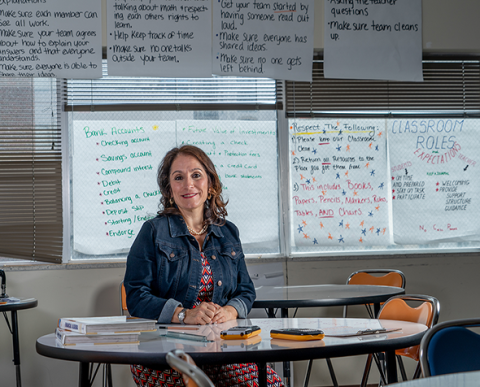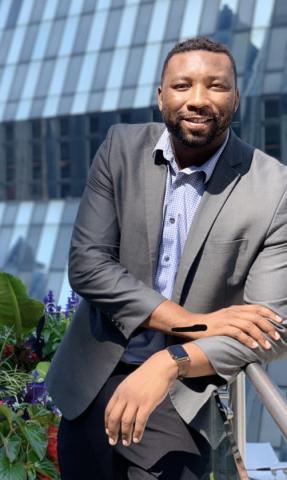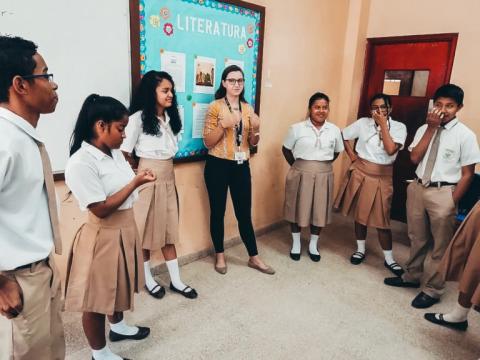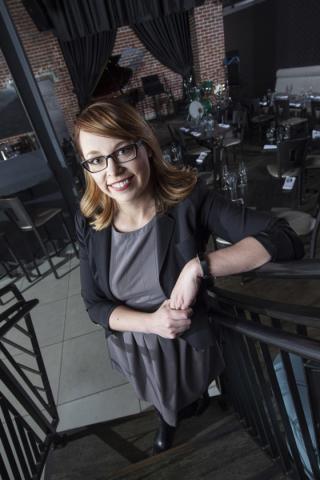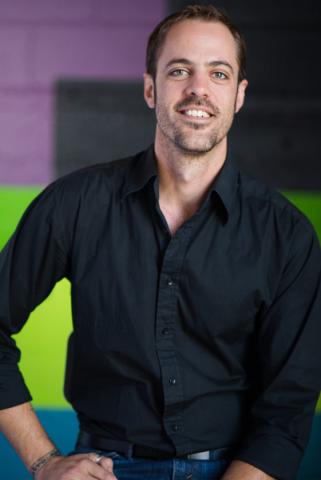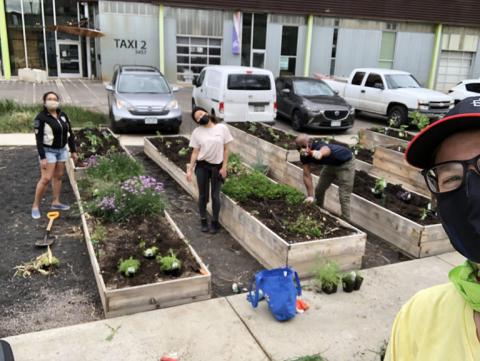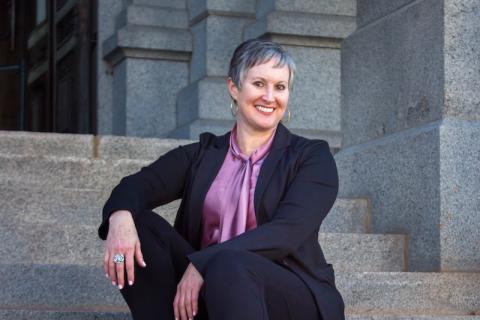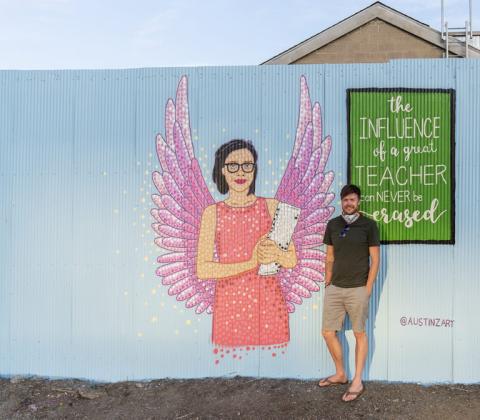Silver Linings Playbook
DU alumni find resilience — and even hope — in the midst of a pandemic
This article appears in the Summer 2020 issue of the University of Denver Magazine. To read more stories from the magazine, please click here.
The COVID-19 pandemic has upended lives, businesses and relationships across the world. Companies and nonprofits are making big changes to the way they do business; students of all ages — and their teachers — are adjusting to online learning; and social distancing has altered everything from weddings and graduations to concerts and theater productions. Through it all, people in nearly every part of society are looking for ways to help.
DU alumni are answering the call in a variety of ways, looking for opportunities to assist their own communities as well as the world beyond their walls. From educators and nonprofit administrators to restaurant owners and entrepreneurs, here’s a look at how 10 alumni are stepping up to meet the challenges of the coronavirus crisis.
THE EDUCATOR: Susana Cordova (BA ’88)
As superintendent of Denver Public Schools, Susana Cordova helped oversee one of the most difficult transitions of the COVID-19 period: the across-the-board shift to online learning for K-12 students and teachers.
“There is no playbook. There is no one right answer. Everybody is trying to figure this out,” Cordova said during an online town hall organized for the University’s 1Day4DU fundraising event in May. “I believe deeply that the people in our district are committed to common values and common beliefs about what is possible for all kids, and that it was going to be really important that we create an approach that supports the best in people and allows for a lot of grace and flexibility during a challenging time.”
In addition to offering teachers and students as much support as possible during the last months of the school year, the district worked to buy laptops and set up internet access for those who needed such assistance.
“We still have areas of the city where, even with broadband internet, connections are not stable,” Cordova said. “We still have some families that are using their telephones for hot spots. The inequities that creates for students [are] really, really challenging.”
One bright spot, she said, is that some students actually learned better in the new environment, doing lessons on their own time and adapting the model to fit their personal schedules.
“The older adolescents who want to be able to sleep later or work later, it has really worked well for,” Cordova said. “It’s worked well for kids who like to be able to work at their own pace. That’s been really gratifying to hear.”
Throughout it all, she said, the district has been using humility and grace as its watchwords, while striving to keep students and teachers connected with one another despite the distance necessitated by the virus.
“We’ve been guided by the belief that this is a time when our students need us more than ever,” she said. “We really are trying to ensure that we are supporting children around their social emotional needs as much as we are around their academic needs. The power of connection is really at the forefront during a time like this.”
THE NURSE: Mary DeWalt (BA ’19)
Mary DeWalt was a Pioneers soccer player for five years before she graduated in December 2019. After completing an accelerated program to become a certified nurse’s assistant, she went to work at UCHealth in Denver. She started at the hospital just as the COVID-19 pandemic began.
“My starting date was kind of when things started blowing up with the coronavirus,” she told 9News in May. “Our floor was actually not a COVID-19 unit right away. We actually just transitioned to being a COVID-19 unit.”
DeWalt sees part of her role as keeping patients’ spirits up during a difficult time.
“Obviously, it’s hard right now in the hospitals, not having visitors,” she said. “I can be that person that can go into the rooms and give them a face and someone to talk to.”
THE CONNECTOR: Anslem Gardner (MBA ’16)
Anslem Gardner found himself in a unique position when the pandemic hit. He was just about to depart his position as a program director at one workforce training program for underserved populations and start a new job at another.
Gardner spent almost three years at Genesys Works, a Chicago nonprofit that trains high school seniors for paid internships — that often cases turn into full-time jobs — at local tech companies. In June, he started a new job as site director at the Chicago outpost of Per Scholas, an organization that does similar work with unemployed and underemployed adults.
“We’ve had classrooms where an 18-year-old fresh out of high school who had no idea what he or she was doing next was sitting next to a 60-year-old who had worked in the fast food industry and was just tired and wanted a desk job with some dignity,” Gardner says. “Both went through Per Scholas successfully. I’m super-pumped about that.”
The training at both organizations involves a mix of technical instruction and professional skills education; the latter now includes time management and other strategies for successfully working from home. The nonprofits worked hard to move trainings online, and most internships have successfully transitioned to work-from-home, Gardner says. At Genesys Works, partnerships with such companies as Apple and Microsoft have ensured that all students have laptops and internet access.
While the pandemic has caused lots of changes in the workplace — including companies closing or laying people off — Gardner is striving to ensure the workforce coming out of Per Scholas and Genesys Works is set up for success.
“The business model is a sustainable one in that we work directly with the partner to understand what their immediate needs are and how to train on them very quickly,” he says. “Something I have done at Genesys Works and want to keep doing at Per Scholas is not just responding to the market or to external factors like coronavirus, but planning for them and understanding how the market and its demand are going to shift and trying to ensure that communities of color aren’t left out again, but can somehow position themselves to be right there in it all.”
THE EVACUEE: Elena Kalahar (BA ’16)
Elena Kalahar was a year into her service with the Peace Corps in the Bocas del Toro province of Panama when the pandemic hit. She was just beginning to feel as though she knew how to maximize her skill set to help school kids learn English.
“A year in service is the time when everybody is starting to feel in the groove of things,” explains Kalahar, who majored in Spanish and international studies. Once Peace Corps volunteers have a few months on the ground, she says, they’ve built trust, established relationships and figured out what works.
In mid-March, the first coronavirus cases were identified in Panama City, and by March 13, Kalahar and the other volunteers in the country received “stand-fast” orders from the Peace Corps. These instructed volunteers to remain in their communities and wait for further word. It was only a matter of hours before the order came to evacuate.
The Peace Corps sent a private bus to pick up its volunteers in the area and transported them to Panama City, where they stayed in a hotel for several days, awaiting a chartered flight out of the country. “The vast majority of the volunteers were just really sad. None of us wanted to go,” she says.
When it looked as though the airport might shut down before the chartered plane could depart, Kalahar booked her own ticket home. Once back in Denver, she had to quarantine in her family’s basement for 14 days, largely because her mother cares for her aging grandmother, who was at particular risk from the virus. Kalahar picked up her meals at the top of the stairs and spent her time finishing up Peace Corps business and reflecting on what to do next.
Then she was invited to join several other Peace Corps volunteers — 7,300 of them were evacuated in just a few weeks — to share her tale via a video produced by Business Insider. That experience whetted her interest in journalism and storytelling, and she’s now planning to pursue a graduate degree in the field. In the meantime, she blogs about her experiences at anopendiary.com and has created a video log, or vlog, for Youtube.
Whatever path she pursues, it’s sure to combine her desire to serve with her urge to explore the world beyond her Colorado home. “I have always had an adventurous spirit,” she says.
THE RESTAURATEUR: Nicole Mattson (BSBA ’03, MBA ’12)
Nicole Mattson, her husband, Scott, and their business partner, Troy Bowen, opened the upscale wine bar Noble Riot in April 2019 as a sibling restaurant to their RiNo jazz club, Nocturne. When the coronavirus hit, they put the pates and charcuterie boards away and made a hard pivot into the comfortiest of comfort foods: fried chicken.
“We had already been testing out a fried chicken recipe to put on the menu at Noble Riot that would come from the Nocturne kitchen, so when we found out that we couldn’t serve people on site anymore, we just said, ‘Well, what is easy to do as a to-go option?’” Nicole Mattson says. “Fried chicken is definitely one of those things.”
So Noble Riot became Noble Fry-it, and the days of curbside pickup began. With Nocturne completely closed, it was a way to keep some money coming in the door — and a chance to keep in touch with regular customers.
“The silver lining was knowing that some of our regulars were still able to come in and check in with us, even during the stay-at-home orders,” Mattson says. “It was lovely to be able to hand off a bag of to-go chicken to couples that have come in to Nocturne for their date night every Wednesday for the last two-and-a-half years. It felt like we were still connected, even though everyone is staying at home.”
The Mattsons also had ingredients on hand at Nocturne they could no longer turn into servable food, so they spent three weeks making soup they donated to families in need through the Denver Metro Emergency Food Network.
“It was just thinking fast and on our feet,” Mattson says. “You always hate, in a restaurant, to throw anything away. Food waste is a big concern. So when there’s an opportunity to feed somebody, we’re always going to try to do it.”
THE ENTREPRENEUR: Isaiah Silva (BS ’19)
Isaiah Silva, an operations manager in the Innovation Labs at DU’s Ritchie School of Engineering and Computer Science, is in charge of an effort using DU resources to create polycarbonate face shields to protect people on the front lines fighting the coronavirus pandemic. Using 3D printers and other equipment from the lab, Silva and his team of students and alumni entrepreneurs can create 200 pieces of personal protective equipment every month.
“It was very clear that this is something that needed to happen,” Silva says. “It’s a really terrible event that’s happening. But at the same time, I see this as being something that creates a lot of good.”
Silva first got to work in April, using personal equipment from his startup company, Atomata. “Now,” he says, “DU is leveraging our resources, and I’m able to do way more than I ever could [on my own].” Silva and his colleagues are distributing shields to the “second responders” staffing nursing homes. DU’s Knoebel Institute for Healthy Aging has helped identify recipients who need the protection most.
DU faculty members Michael Caston and Kerstin Haring have facilitated the use of the University’s 3D printers, which have been instrumental in growing the effort as the pandemic stretches on.
“There’s some talk of a second wave or even a third wave this fall or winter,” Caston says. “I think the innovation lab is prepared to at least serve the DU community in terms of needs of PPE production.”
Also leading the charge are several DU students, as well as alumni Jacob Goldman and Rob Paddock, who are using the equipment from their startup company, Ahead Wind, to expedite production.
“It’s really just a matter of digging in and identifying what you can do,” Silva says. “For us, I know that we are exceptional at prototyping and rapid manufacturing. It’s awesome that we’re in a position where it’s not just DU persisting at a time like this, it’s all the universities.”
THE GIVER: Joseph Teipel (BA ’07)
For the two-year-old Chaffee County Community Foundation in southern Colorado, the COVID-19 pandemic provided an opportunity to raise the organization’s visibility and let people know just what kind of a role a community foundation can play in times of crisis. One of 1,200 such organizations in the country, the Chaffee County Community Foundation seeks to increase philanthropic and technical assistance resources in Buena Vista, Salida, Poncha Springs and other towns in the county.
Led by alumnus Joseph Teipel, the foundation is using its donation-supported emergency fund during the crisis to aid local nonprofits and to give direct cash assistance to those in need.
“We have a pretty good understanding of both community and nonprofit landscapes and needs,” says Teipel, who co-founded the Re:Vision nonprofit in Denver before returning to his home county last year to run the community foundation. “There’s no one else in the county — and very few others in general — giving out direct cash payments as a form of relief during this time. Folks who aren’t financially impacted by COVID have really wanted to help their friends and neighbors and community. This has given them a tool to do that in a way they know they can trust.”
By mid-May, the foundation had distributed more than $150,000 of direct payment assistance to more than 220 households, partnering with the county’s Department of Human Services to review applications. Teipel is starting to look beyond the crisis to a future where the foundation’s role is clearer and more visible to the organizations and individuals it supports.
“A silver lining in all of this is that as a young organization, very few people knew about us,” he says. “Folks were asking, ‘What’s the point of a community foundation when we have a Boys and Girls Club that’s doing a great job with the kids, and these other organizations are already here?’ This has really been a chance for us to showcase what a community foundation can do and the value we provide. The boost that we’re getting from this will help us launch some of the other things that we’ve been starting to work on as well, and give them more validity.”
THE NOURISHER: Matt Vernon (MBA ’15)
The restaurant business was hit hard by COVID-19, but the Comal Heritage Food Incubator — a nonprofit restaurant and on-the-job training center that helps immigrant and refugee women open their own food businesses or get jobs in the restaurant industry — had a different challenge in the midst of the pandemic. Comal wanted to keep its trainees learning — and paid — while the restaurant was shut down.
So safety and other trainings were quickly moved online, most in a series of prerecorded videos to accommodate the varied schedules of Comal’s multigenerational students. Donations kept the paychecks coming, and a small number of live Zoom chats kept the restaurant’s community connected.
“The first one was powerful,” says alumnus Matt Vernon, general manager of the restaurant and training center in north Denver. “All the ladies hadn’t seen each other together in almost a month at that point, and there were tears and everybody was excited to see each other. It was a moment of that Comal family feeling, coming back together and saying, ‘We’re still in this together, we’re still here for each other, just a little bit different.’”
The restaurant also supported its employees by ordering extra food and supplies to create a sort of emergency pantry. Sous chef Claire Westcott kept the kitchen open all by herself, cooking up batches of soups from around the world that were sold at Comal on a takeout basis and donated to people in need through the Denver Metro Emergency Food Network.
The nonprofit’s next challenge? Pivoting its business model to fit a new reality where the catering and restaurant businesses its graduates once strived to create are no longer as viable. One answer may be cottage food production, where trainees would scale up recipes from their native cultures to sell in grocery stores or online, perhaps with accompanying how-to videos that would allow viewers to make donations.
“It’s an information-age skill set, to translate the skills and knowledge of these wonderful heritage recipes to teach online,” Vernon says. “They can stay safe at home, produce their own foods and hopefully get into these retailers that are doing well right now.”
THE LOBBYIST: Lisa Ward (MS '20)
While earning her master of science degree in University College’s Health Care Management program, Lisa Ward was working part time as a lead emergency medical technician at Denver Health on the frontlines of a pandemic.
Immediately after wrapping up her final quarter at DU, Ward landed her dream job as a lobbyist for Denver Health, advocating on behalf of health care workers for anything they need. Her new position is more important than ever with the world fighting COVID-19.
“Right now, with a pandemic going on, it’s my responsibility to advocate on behalf of Denver Health for things like PPE for our health care workers,” Ward says. “Being on the front lines really gives me such a unique perspective to the other side of it. When I listen to the incident command center briefings and they talk about PPE, I know what it feels like to wear an N95 [mask] for 12 hours. I understand how difficult this is emotionally for health care providers.”
The transition to a new role on the front lines of a pandemic was especially challenging. That challenge is captured in a personal essay — titled “Out of the Trenches, Into the War” — that Ward shared with the University of Denver Magazine:
“I can clearly visualize what it feels like to be at the bedside of a patient unable to breathe,” Ward writes. “My ears ring with the sounds of ventilator alarms working to aid an intubated patient. I sympathize with exhausted frontline providers who are caring for critically ill patients while worrying about their own safety. For the first time in my long-standing career, I also know what it looks like to see unprecedented desperation on the faces of sick patients and terror in the eyes of my fearless colleagues.”
THE ARTIST: Austin Zucchini Fowler (attd. 2007–11)
Austin Zucchini Fowler created some of the most visible tributes to those fighting the coronavirus pandemic. The artist and DU Hilltoppers swim coach spray-painted a series of large-scale murals on building walls throughout downtown Denver featuring teachers, health care workers, first responders and others on the front lines.
“The first responder piece is particularly meaningful to me because my oldest brother is not only a doctor, but he’s also in the U.S. Army,” says Fowler, who took classes at DU’s School of Art and Art History. “The piece represents some of the cool stuff that he’s done over the past couple of years.”
Fowler created his first mural — a nurse with wings and boxing gloves — in April on a blank wall on East Colfax Avenue. The response took him by surprise.
“I was getting the most incredible emails from health care workers,” he says. “The coolest thing they were giving me feedback on was that it boosted morale in the hospital. It was something to talk about, something to visit. A lot of them would go and take pictures in front of it — and they felt empowered. They were so grateful for the message.”
Encouraged by the feedback — and the business owners who began reaching out and asking him to create similar artwork on their walls — Fowler decided to create a series of murals to express the gratitude of an entire city.
“I love the community aspect of public work. I wanted the thank you and gratitude not just to come from me, but from the community,” he says. “I’m not the only one who is feeling grateful right now. It was cool to send a message that a lot of people are feeling and represent the community as a whole in that way.”








